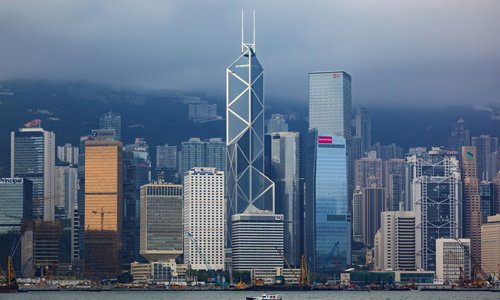HOME >> OPINION
Poking its nose into other countries’ affairs is an American obsession
By Cale Holmes Source:Global Times Published: 2019/8/26 19:48:40

Photo: VCG
By boycotting Disney film Mulan and rap group Higher Brothers and not Jimmy Lai Chee-ying, a pro-Hong Kong secessionist and businessman, and US Senator Marco Rubio, many outside observers have shown how little they understand China.
Hong Kong radical protesters have received Western sympathy, inspiring articles slamming Chinese rappers Vava and Higher Brothers for their solidarity with the Hong Kong police and pro-Beijing protesters on social media platforms.
Liu Yifei, the actress in Disney's Mulan remake, is facing a boycott for supporting the Hong Kong police. Actor and kung fu legend Jackie Chan has not been immune from slander. After the actor made a plea for peace, he earned the ire of Hong Kong netizens and a report that insinuated he "feigned ignorance" about the protests in Hong Kong.
US, British, and Australian commentators paradoxically view these celebrities' support of their national sovereignty as political incorrectness and pressure from the Communist Party of China.
In Western media, the word of Anson Chan Fang On-sang, a major culprit behind unrest in Hong Kong, is treated as right and immune to journalistic research, or scrutiny. Nathan Law Kwun-chung, the main agitator behind the Hong Kong riots, is considered a freedom fighter yet zero attention has been paid to how the "brave kid" has ditched the protests in Hong Kong to study at Yale University. But for US commentators, Jackie Chan and Liu Yifei are mouthpieces. It shows how Western media outlets still do not understand China.
Protesters have flown the British flag. Since the end of the First Opium War in 1842 and to 1985, when Beijing began to draft the Basic Law system introducing the "one country, two systems" policy, there was no democracy in Hong Kong.
It wasn't until Britain returned Hong Kong to China that the city began practicing, albeit limited, adult suffrage. The city's election system pre-1995 featured British control, with the 1991 direct elections including appointments from the colonial governor. If anyone is familiar with Hong Kong democracy, it's due to Chinese sovereignty, and not from 150 years of colonization.
At least 700,000 Hongkongers support the shelved extradition bill backed by Chief Executive Carrie Lam Cheng Yuet-ngor. US media has sidelined these voices who do not see their compatriots on the Chinese mainland as enemies.
The extradition bill clearly outlined the ability of Hong Kong judicial officials to review political cases. This was not an attempt by Beijing to curb criticism or dissent. It was an attempt by Hong Kong's rational leaders to ensure that crimes such as homicide committed by a Hong Kong citizen in Taiwan, or anywhere else in the world, could be prosecuted.
After examining the protest leaders and financiers, a movement of elites is revealed. Retail tycoon and "head of the opposition media" Jimmy Lai, who's been called the "Rupert Murdoch of Asia," reportedly has CIA ties and is painted as "pro-democracy." Lai, along with the US-funded National Endowment for Democracy, reportedly bankrolled the 2014 Hong Kong protests. In 2012, Lai's Apple Daily carried a full-page advertisement portraying mainlanders as "invading locusts." It called for a ban on the "unlimited invasion of mainland pregnant women in Hong Kong."
China has proven that its political system works and works well. Aside from lifting 800 million people out of poverty, the country has guaranteed social, economic, and political rights.
In Shenzhen, there are 2.7 doctors per 1,000 people, higher than China's national average of 2.3 doctors per 1,000, and Hong Kong's average of 1.9 doctors per 1,000. Mainland women represent 57 percent of the workforce, compared to Hong Kong's 51 percent, higher than Japan, Singapore and Malaysia.
Martin Lee Chu-ming, the founder of Hong Kong's Democratic Party, an anti-Beijing front, received the 1997 "Democracy Award" from the National Endowment for Democracy.
Recently, Lai met with US National Security Advisor John Bolton. He told US media that no president understands China like US President Donald Trump.
While Westerners may view these meetings as polite congressional consultations, the truth is that violence is just as much a part of Hong Kong separatism as photo ops with US lawmakers.
Jackie Chan is right. The past few months have been sad and depressing for those who live in Hong Kong. The safety guaranteed on the streets of Beijing and Xi'an should be available to the people of Hong Kong. China should not be asked to compromise its sovereignty. If Americans want to boycott anyone, they should do so with their politicians who support the Hong Kong unrest.
The author is a journalist who has worked for RT, Mintpress News, and Global Times. opinion@globaltimes.com.cn
Posted in: VIEWPOINT